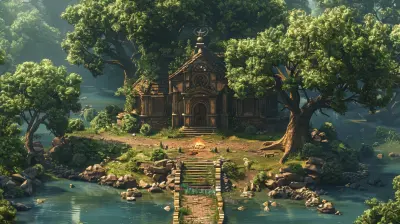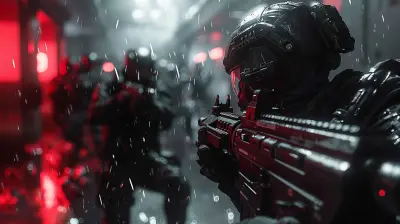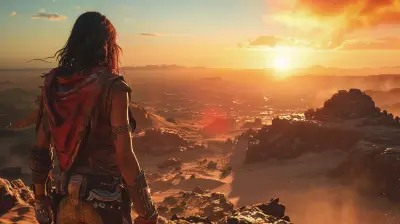The Future of Game Soundtracks: Trends and Predictions in Music Production for Games
30 September 2025
Ever found yourself humming a tune from a video game hours after you’ve stopped playing? You’re not alone. Game soundtracks are no longer just background filler—they’ve become emotional powerhouses, artistic masterpieces, and crucial storytelling tools all rolled into one. But what’s next?
Let’s dive into the future of game soundtracks. We’re talking mind-blowing trends, smart tech, and the evolving role of music in making our gaming experiences unforgettable.
A Quick Look Back: How Far Game Music Has Come
Before we jump into the future, let’s rewind.Video game music had humble beginnings—remember the 8-bit beeps of Pac-Man or Super Mario Bros.? Back then, limitations in hardware meant composers had to get really creative, squeezing emotions out of a few simple tones.
Fast forward to today, and we’ve got fully orchestrated symphonies, adaptive soundscapes, and even Grammy-winning scores (shoutout to Assassin's Creed Valhalla!).
So, where do we go from here?
1. Adaptive Music: The Beat That Changes With You
One of the most exciting shifts in game soundtracks is the rise of adaptive music, also known as dynamic or reactive music. It's like having a soundtrack that follows your every move—kind of like having a personal DJ for your gameplay.What Is Adaptive Music, Really?
In simple terms, it’s music that changes based on what's happening in the game. Say you're sneaking around in Hitman—the music stays low and tense. But the second you blow your cover? Boom, the tempo races, instruments pile in, and your heart starts thumping.This isn’t just cool—it makes the game feel alive.
Why It’s the Future
As technology advances, expect even greater levels of musical interactivity. Imagine soundtracks that respond not just to your in-game choices but to your play style, heart rate (yep, that’s a thing), or even voice tone if VR gets that immersive.Games will literally be scoring you—and that’s next-level immersion.
2. AI-Driven Music Composition: When Machines Play Maestro
Yep, artificial intelligence is crashing the composer’s party. And it’s not just randomly generating noise—it’s actually starting to understand mood, pacing, and emotional beats.Real Use Cases Already Happening
Indie developers with tight budgets are already using AI-generated music engines like AIVA or Amper Music. These tools can crank out a "boss battle" track or a "relaxing village" loop in minutes.But it’s not about replacing humans (yet). Think of AI as a musical sidekick—great for quick drafts, filler tracks, or sparking ideas that human composers can bring to life.
The Pros and Cons
Pros:- Faster production
- Lower cost
- Infinite variation
Cons:
- Lack of emotional depth (so far)
- Risk of sounding “samey” or soulless
Still, as AI gets smarter (and it will), expect it to play a bigger role in game music creation. Just hopefully not all the roles.
3. Procedural Generation: Infinite Music for Infinite Worlds
Procedural generation isn’t just about creating vast open worlds on the fly (No Man’s Sky, anyone?). It’s also being used to create never-ending, evolving music.Music That Never Repeats
In procedural soundtracks, the game engine mixes and matches musical elements in real-time—tempo, instrumentation, melody—so no two players hear the exact same track.This is perfect for open-world or sandbox games. Imagine walking through a forest in a fantasy RPG, and the trees, wildlife, and weather all subtly shift the background music. It’s like nature itself is composing your soundtrack.
Where It’s Headed
Look out for games that use procedural music to reflect player emotion, time of day, or narrative arcs. Combined with AI and adaptive tech, the possibilities are endless. Literally.4. Collaboration with Mainstream Artists
We’ve seen a wave of major musical artists jumping into the game scene. Think Travis Scott’s virtual concert in Fortnite, Grimes in Cyberpunk 2077, or The Weeknd partnering with Tom Clancy’s Rainbow Six events.Why Big Names Are Entering Game Music
Let’s face it—games are the new blockbuster movies. They’ve got millions of eyes, cultural cachet, and a younger audience that often skips traditional media.Mainstream artists want in. And developers want their star power.
What This Means for the Future
Expect more games with original tracks from chart-toppers. Maybe even whole albums designed as companion pieces to major game launches. And with the rise of in-game events and virtual concerts? We might even see games become music platforms in their own right.5. The Rise of Interactive Music Scores in Virtual Reality (VR) and AR
VR and AR aren’t just transforming gameplay—they’re reshaping how we experience sound.Immersive Audio = Next-Level Soundtracks
In VR, music isn’t just stereo background noise—it’s a 360-degree experience. You don’t just hear a violin string from the right; you feel it swirl around you as you move.Spatial and binaural audio make you feel like you’re literally inside the music.
Soundtracks That React to Movement
Imagine playing a fantasy VR game where a soft melody gets louder as you approach a hidden cave. Or an AR horror game where heavy breathing creeps up behind you—because your phone knows where you're standing.This kind of reactive, spatial audio creates a new frontier for storytelling through sound—and it’s only just beginning.
6. Nostalgia and Retro Revival: Chiptunes Aren’t Dead
Funny thing about trends—they tend to boomerang. As much as we chase the new, there’s still a giant love for the old.Old School Beats, New School Tech
Chiptune music (that classic 8-bit sound) is making a comeback, not just in indie games like Celeste or Shovel Knight, but even in mainstream releases that want to tap that nostalgic nerve.Remastered soundtracks, lo-fi game remixes on Spotify, and retro-inspired sound packs are all the rage.
Why It Works
Nostalgia is powerful. And when paired with modern production tools, it creates this magical blend of past and present. It’s like comfort food for your ears.7. Music as Narrative: Storytelling Through Sound
This might be the most subtle but powerful trend of all.Not Just Background—Backbone
In modern games, music isn't just there to set the mood. It guides the player emotionally, foreshadows plot twists, or even acts as a character in its own right.Games like Journey, The Last of Us, and Hollow Knight use music as a narrative glue. Without it, the story just wouldn’t hit the same.
The Next Step in Musical Storytelling
We’re likely to see future games where music evolves with choices you make—like a "musical morality meter" that shifts based on your actions.Or maybe entire games where gameplay and music are completely intertwined, like a choose-your-own-adventure album you can play.
8. Community-Driven Soundtracks: Let the Players Compose
Here’s a wild idea—what if the soundtrack wasn’t made by a composer or AI but by you?Modding and Custom Soundtracks
Games like Skyrim and Minecraft already have massive modding communities that create custom music packs. Some developers are now leaning into this, offering tools that let players shape their game’s sound.Real-Time Music Creation
Imagine a rhythm-based RPG where your choices and clicks compose a personalized soundtrack as you move through the world. It’s not just playing a game—it’s creating art.The Business Side: Soundtracks as Merchandise
Let’s not ignore the booming business of soundtracks. Game OSTs are now hot sellers on vinyl, streaming apps, and even live orchestral tours.From Halo to Final Fantasy, game music isn’t just background ambience—it’s merch, pop culture, and a genre of its own.
Final Thoughts: A Symphony in the Making
The future of game soundtracks is an exciting mashup of tech, art, and emotion. We’re heading into a world where music doesn’t just support gameplay—it becomes gameplay. Where emotional depth meets adaptive design, and where no two playthroughs sound the same.The next time you’re lost in a game world, close your eyes and listen—you might just be hearing the future unfold, one note at a time.
all images in this post were generated using AI tools
Category:
Original SoundtracksAuthor:

Audrey McGhee
Discussion
rate this article
2 comments
Nyx Spencer
Exciting times await in the world of game soundtracks! As technology advances, we can expect immersive experiences that elevate storytelling and gameplay. Embrace these innovations—let them inspire your creativity and passion for gaming. The future of sound is truly exhilarating!
December 30, 2025 at 3:33 AM

Audrey McGhee
Absolutely! The evolution of technology will undoubtedly enhance soundtracks, enriching both storytelling and gameplay. Exciting times ahead!
Kylie Conrad
Exciting insights on evolving soundtracks!
September 30, 2025 at 2:45 AM

Audrey McGhee
Thank you! I'm glad you found the insights exciting!


